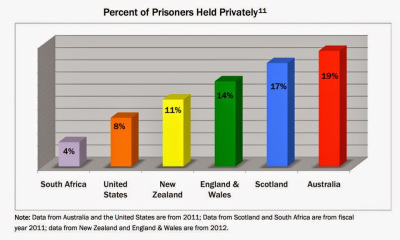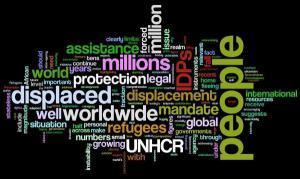Isobel Blackthorn's Blog, page 50
July 19, 2014
An Assault on the Downing of MH 17
 I had to watch the news last night, on SBS and ABC. And of course I endured the tedious repetition, the over-dwelling on the usual crisis dimensions from the flowers and the tears to the stock phrases of politicians. And I felt sorry for Putin. Not because I am suckered in by his hang dog looks on camera, but because he has been made the fall guy in such a direct and ruthless manner. The West hailing in the process the old Cold War ideology of big bad Russia (with the attendant sub-text of big bad communism).
I had to watch the news last night, on SBS and ABC. And of course I endured the tedious repetition, the over-dwelling on the usual crisis dimensions from the flowers and the tears to the stock phrases of politicians. And I felt sorry for Putin. Not because I am suckered in by his hang dog looks on camera, but because he has been made the fall guy in such a direct and ruthless manner. The West hailing in the process the old Cold War ideology of big bad Russia (with the attendant sub-text of big bad communism).
I abhor hypocrisy. Since when does the West point a finger at itself? Since when does the United Nations condemn it’s nursing mother America for supplying weapons that kill innocents?
There is every chance that MH17 was shot down by the ultra-right wing Ukrainian government. Every chance that this single atrocious act was orchestrated by an inner circle (possibly with ties to Uncle Sam) in order to elevate tensions, justify all manner of sanctions and retaliations, garner support from a wavering Europe and of course further demonise and ostracise Russia.
Last night I knew I was being indoctrinated by mainstream news. Even the matter of access to the crash site, apparently thwarted by separatist militia, was no doubt a construction of circumstances. Mainstream media was on this occasion so unashamedly predatory and melodramatic, squeezing every last drop of milk from the udder of catastrophe, that I stood up and went to do the dishes.
Peace be upon those two-hundred and ninety-eight who lost their lives and those who are suffering their loss.
Peace be upon the millions of innocents in Iraq, in Syria, in Gaza, in Sudan, in the Congo, in the Central African Republic, their dead and maimed and the families who mourn, peace be upon the displaced and those huddled in border camps, and peace be upon all those who seek a return to their peace…


July 18, 2014
War? – Not in MH17’s Name.
 Ferdinand moments – The swift and hysterical escalation in Gaza over a crime that may have been perpetrated by any old psycho beggars belief. And now in Ukraine we have a magnificent trigger, one that will justify to all the justness of any act of vengeance or ”punishment.” – Why air Malaysia? – probably no reason, but the number of AIDs conference attendees makes the act all the more an outrage.
Ferdinand moments – The swift and hysterical escalation in Gaza over a crime that may have been perpetrated by any old psycho beggars belief. And now in Ukraine we have a magnificent trigger, one that will justify to all the justness of any act of vengeance or ”punishment.” – Why air Malaysia? – probably no reason, but the number of AIDs conference attendees makes the act all the more an outrage.
The crash is another whodunnit – whether perpetrated by Russian-backed rebels (by accident or design) or the far-right Ukrainian government (by design), we can be sure that we will be told the rebels did it.
The best question to ask in these situations is who benefits? Whether by orchestration or opportunism the warmongers are the primary beneficiaries.
And the warmongers are champing at the bit for war as ever they are. Better a plethora of proxy wars than one fought by own armies or worse, on own soil.
I am so sorry for the human loss. For all the suffering families. But I do think we owe it to all who are gone and to all who suffer not to follow Israel and allow hysteria and intense emotions to cloud our judgement. WAR? – Not in MH17’s name.


War? – Not in MH17′s Name.
 Ferdinand moments – The swift and hysterical escalation in Gaza over a crime that may have been perpetrated by any old psycho beggars belief. And now in Ukraine we have a magnificent trigger, one that will justify to all the justness of any act of vengeance or ”punishment.” – Why air Malaysia? – probably no reason, but the number of AIDs conference attendees makes the act all the more an outrage.
Ferdinand moments – The swift and hysterical escalation in Gaza over a crime that may have been perpetrated by any old psycho beggars belief. And now in Ukraine we have a magnificent trigger, one that will justify to all the justness of any act of vengeance or ”punishment.” – Why air Malaysia? – probably no reason, but the number of AIDs conference attendees makes the act all the more an outrage.
The crash is another whodunnit – whether perpetrated by Russian-backed rebels (by accident or design) or the far-right Ukrainian government (by design), we can be sure that we will be told the rebels did it.
The best question to ask in these situations is who benefits? Whether by orchestration or opportunism the warmongers are the primary beneficiaries.
And the warmongers are champing at the bit for war as ever they are. Better a plethora of proxy wars than one fought by own armies or worse, on own soil.
I am so sorry for the human loss. For all the suffering families. But I do think we owe it to all who are gone and to all who suffer not to follow Israel and allow hysteria and intense emotions to cloud our judgement. WAR? – Not in MH17′s name.


War? – Not in MK17′s Name.
 Ferdinand moments – The swift and hysterical escalation in Gaza over a crime that may have been perpetrated by any old psycho beggars belief. And now in Ukraine we have a magnificent trigger, one that will justify to all the justness of any act of vengeance or ”punishment.” – Why air Malaysia? – probably no reason, but the number of AIDs conference attendees makes the act all the more an outrage.
Ferdinand moments – The swift and hysterical escalation in Gaza over a crime that may have been perpetrated by any old psycho beggars belief. And now in Ukraine we have a magnificent trigger, one that will justify to all the justness of any act of vengeance or ”punishment.” – Why air Malaysia? – probably no reason, but the number of AIDs conference attendees makes the act all the more an outrage.
The crash is another whodunnit – whether perpetrated by Russian-backed rebels (by accident or design) or the far-right Ukrainian government (by design), we can be sure that we will be told the rebels did it.
The best question to ask in these situations is who benefits? Whether by orchestration or opportunism the warmongers are the primary beneficiaries.
And the warmongers are champing at the bit for war as ever they are. Better a plethora of proxy wars than one fought by own armies or worse, on own soil.
I am so sorry for the human loss. For all the suffering families. But I do think we owe it to all who are gone and to all who suffer not to follow Israel and allow hysteria and intense emotions to cloud our judgement. WAR? – Not in MK17′s name.


June 20, 2014
On a cold Night
Awake at three thirty. Very cold again. World Refugee Day but my attention was elsewhere for much of the day. But at three thirty my mind had decided to calculate the income of asylum seekers on bridging visas (80% of dole), surmising the sort of rent they would pay. Not a lot left for food. After food comes bills, clothes, travel fares etc.Not allowed to earn any income and unaware of such practices as dumpster diving, how to get free (suspended) coffees and free food from food banks and charities they really do it tough. So I pictured asylum seekers lying in their beds in freezing cold houses and dressed in overcoats throughout the day. Then I widened the net to include all disadvantaged groups, especially the homeless who are surely even worse off. Sleep didn’t come back to me. Now I sit here at my desk in my overcoat in my cold house, thinking of knitting jumpers and wondering if beanies might be a better plan.


June 17, 2014
…the Forces of Darkness.
It is always good to discover new voices that contribute to a critique of our time. Much is made of George Orwell and Franz Kafka whose insights in literary form resonate with many today. Out of the same groundswell of intellectual, artistic and literary dissent and concern for the suffering of humanity that emerged in the first half of the twentieth century, came second-generation Theosophist, Alice Bailey. Out of her vast collection of works, many of them metaphysical in nature, can be found some valuable insights into the nature of humanity. Today, I stumbled upon this paragraph while researching background material for my latest project.
Writing in 1938, Bailey writes:
”The Forces of Darkness are powerful energies, working to preserve that which is ancient and material; hence they are pre-eminently the forces of crystallisation, of form preservation, of the attractiveness of matter, and of the lure of that which is existent in the form life of the three worlds. They consequently block deliberately the inflow of that which is new and life-giving; they work to prevent the understanding of that which is of the New Age; they endeavour to preserve that which is familiar and old, to counteract the effects of the oncoming culture and civilisation, to bring blindness to the peoples and to feed steadily the existing fires of hate, of separateness, of criticism and of cruelty. These forces, as far as the intelligent peoples of the world are concerned, work insidiously and cloak their effort in fair words, leading even disciples to express hatred of persons and ideologies, fostering the hidden seeds of hatred found in many human beings. They fan to fury the fear and hate of the world in an effort to preserve that which is old and make the unknown appear undesirable, and they hold back the forces of evolution and of progress for their own ends.” Externalisation of the Hierarchy, Lucis Trust, 1957, p 76.
I find this an excellent summation of the crises humanity faces at the current time: Whether climate change, war, hunger, social injustice, at root all these crises have been and continue to be fostered by the corruption and selfishness of the world’s powerful elite. Bailey’s is one voice among many, her perspective inspiring some and not others. I draw from a number of wells but find it refreshing to dip into her esoteric waters now and then, even if, as today, purely by chance.


June 14, 2014
Alice Bailey and the Externalisation of the Hierarchy
Writing from the end of WWI through to 1949, Theosophist Alice Bailey was concerned for the well-being of the whole of humanity. She saw the rise of fascism in Europe as an evil that must be abated. She could see that dark forces were afoot on the planet, and believed that these forces were fundamentally materialistic and that for humanity to free itself from their vice-like grip, each individual must learn to recognise and learn to dispel glamour and illusion; learn that the nature of evil is selfishness, with all the associated greed and lust for power. Individuals must train themselves to avoid all selfishness, serve humanity and exercise goodwill. And train in the creation of thoughtforms (ideas, concepts, theories) that would help to raise awareness and benefit humanity. Finally, Alice Bailey placed great faith in the United Nations as the single global humanitarian vehicle in the service of human and planetary betterment.
What has happened to her work today? Setting aside her followers who continue to practice and apply her teachings, often behind the scenes; Alice Bailey, for example, inspiring founder of Transpersonal Psychology Roberto Assagioli who was a Secretary of her Arcane School of Esoteric Practice. Setting aside too those bloggers and commentators who follow on from evangelical Christian, Constance Cumbey, whose work, The Hidden Dangers of the Rainbow (Huntington House, 1983) I and others have discredited on the grounds of poor scholarship and false claims. Commentators such as Cumbey persist in denigrating Bailey’s teachings, largely by aligning her work with the anti-Christ.
It would seem that Alice Bailey’s teachings are being used elsewhere in text-book fashion, not for the purposes they were intended but to bring about conditions such as those depicted in the works from Orwell and Kafka. In other words to foster not spiritual enlightenment but a blanket of darkness, making full use of her notion of the manifestation and function of glamour and illusion.
Nowhere is this more apparent than in the various think tanks from the Heartland Institute to Australia’s Institute of Public Affairs, dedicated to producing propaganda, lies and spin, misinformation, disinformation, to perpetuating ideology and, most insidious of all, to the appropriation and systematic undermining of critical concepts aligned to thoughtforms seeking human and planetary betterment, words with enormous conceptual power such as inclusivity, empowerment, sustainability and so on. In essence through these think tanks the creation of glamour and illusion is all-pervasive and hugely successful, aided and abetted as it is by the mainstream media.
We are living therefore in an era of lies, where a thing is in reality its own other, its opposite. The United Nations, for example, and for Bailey humanity’s greatest hope, seems to have been reduced to a front organisation designed to perpetuate the myth of humanitarianism and progress. As a front it perpetuates gloss, an illusion without substance, a far-reaching veil behind which the reality of power, addicted to a cult of violent destruction, resides.
Exacerbating an already dire situation, a veil of narcissism has descended on our planet. Constructed in the 1950s, largely through such institutions as Hollywood, the internalisation of narcissism is so successful, so aligned and intertwined with consumerism and the entire neoliberal capitalist project that few can successful wrest themselves from its grasp.
Put simply, it would appear that Alice Bailey’s books have been opened by the wrong hands. She would call these hands the Black Lodge, her work, seeking to establish the conditions for the emergence on our planet of the White Lodge, or Spiritual Hierarchy. I regard both lodges in a metaphoric way, ascribing them symbolic and not literal truth. For it is metaphoric or artistic ways of knowing that have the power to cut through veils of glamour and illusion.


April 18, 2014
Fascists For Europe by Adam Blanden
This piece was first published in blog form by Dissent: A Quarterly of Politics and Culture, 15 April 2014, on the unfolding events in Ukraine. The rise of nationalism, or identity politics is widespread across the world in the face of ongoing integration into globalised capitalism. A perhaps softer yet nevertheless insidious sentiment is prevalent here in Australia, as can be seen with proposed changes to Section 18C of the Racial Discrimination Act to allow bigots to have their say. Or to the heinous treatment of asylum seekers in detention centres from Villawood to Manus Island and Nauru.
As Adam Blanden states, ”historically, ultra-nationalism has only emerged where existing systems of social security and the organization of work have been radically undermined (as in the wake of the collapse of the Soviet Union and Yugoslavia) and where social forces for change (in the form of political parties or unions or wider civil society movements) have splintered. In these circumstances, the highly disciplined and increasingly articulate far right tends to outpace the centrist dinosaurs and eclipse the left. These are the conditions we’re in now. And they’re bringing ultra-nationalism and racism back to the heart of the EU.” As market fundamentalism stretches its tentacles into every pocket of this earth, a steady suckering and furling back into the mouth of this voracious beast through imposed structural adjustments of the IMF, the string-laden loans of the World Bank, the pressures of the World Trade Organisation, through corruption and sweetheart deals, and as this fundamentalism disenfranchises the poor and forces millions into even greater poverty, little wonder such nationalisms are on the rise.


April 16, 2014
Easter Is Not Named After Ishtar, And Other Truths I Have To Tell You
A pertinent and timely piece.
 Originally posted on :
Originally posted on :
If there is one thing that drives me absolutely bananas, it’s people spreading misinformation via social media under the guise of “educating”. I’ve seen this happen in several ways – through infographics that twist data in ways that support a conclusion that is ultimately false, or else through “meaningful” quotes falsely attributed to various celebrities, or by cobbling together a few actual facts with statements that are patently untrue to create something that seems plausible on the surface but is, in fact, full of crap.
Yesterday, the official Facebook page of (noted misogynistandeugenicsenthusiast) Richard Dawkins’ Foundation for Reason and Science shared the following image to their 637,000 fans:

Neither Reasonable Nor Scientific
Naturally, their fans lapped this shit up; after all, this is the kind of thing they absolutely live for. Religious people! Being hypocritical! And crazy! And wrong! The 2,000+ comments were…
April 13, 2014
Colin Penter on the Private Prison Industry
The power of the corporate (private) prison industry and why Australia has the highest proportion of private prisons in the world
Sunday 13th April 2014
“Research to date on private prisons has found that they perform no better than publicly operated facilities, are not guaranteed to reduce correctional costs, and provide an incentive for increasing correctional and detention populations. Despite these repeated failings, many countries, including those facing serious problems in the quality and capabilities of their correctional systems, have followed the United States in adopting a flawed and shortsighted scheme.”
A Report by the Sentencing Project titled International Growth Trends in Prison Privatization shows that Australia has the highest proportion of prisoners in private (corporate) run prisons in the world.

The table shows that the percentage of prisoners held in private prisons in Australia is 19%, compared to 17% in Scotland, 14% in England and Wales and 11% in New Zealand. (Given that the data used in the report is from 2011 it is highly likely that the proportion of prisoners in private prisons in Australia would be higher now in 2014)
Some Australian states, like Victoria, have a higher proportion of prisoners in private prisons. In Victoria nearly one third of prisoners are held in private prisons, giving it the highest level of prison privatization of any jurisdiction in the world.
The US has the highest number of prisoners held in private/corporate run prisons, but the percentage of prisoners in private prisons is 8%.
The population of people held in private prisons in Australia has increased 95% in the past 15 years. In that same period, the number of prisoners in state-run jails grew by 50 per cent and the total prison population increased by 57 per cent.
The rapid and consistent increase in the number of prisoners over the last two decades, coupled with a 106% prison occupancy rate, creates an opportunity for private prison corporations to thrive.
Another reason for the growth in the numbers of detainees in corporate run prisons in Australia has been the enormous growth in the number of asylum seekers detained in immigration detention prisons run by Serco (on shore and Christmas Island) and Transfield (Naura and Manus Island).
What is happening in Australia is consistent with international trends. The reportInternational Growth Trends in Prison Privatization by the Sentencing Project found that:
At least 11 countries, spread across North America, South America, Europe,Africa, Australia and New Zealand are engaged in some level of prison privatization.
The private prison market outside the US is dominated by 3 corporations- Serco, G4S and Geo Group.
Immigration detention has become a rapid growth market for the private prison corporations.
The profit motive of private prison corporations often leads to inadequate services and unsafe conditions.
The private run prisons are immensely powerful and profitable, with the corporations involved in running private prisons making increased profits across all jurisdictions in which they operate.
“The prison industry complex is one of the fastest-growing industries in the United States and its investors are on Wall Street. “This multimillion-dollar industry has its own trade exhibitions, conventions, websites, and mail-order/Internet catalogs. It also has direct advertising campaigns, architecture companies, construction companies, investment houses on Wall Street, plumbing supply companies, food supply companies, armed security, and padded cells in a large variety of colors.”
Even a pro-prison privatization advocate, such as Professor Richard Harding notes that the prison corporations such as GEO and Serco are more powerful than the governments they deal with.
Private prison corporations have a vested interest in mass incarceration and policies that result in more people being imprisoned. As Paul Allizi writes:
The larger the prison population, the longer the sentences, the larger the payout under government contracts. The more prisoners, the more prisons, the more growth. Cheaper facilities and fewer services mean more profit. These inescapable relationships are the source of the potential conflicts of interest. The incentives of private prison companies can easily become opposed to the aims of the humane containment and rehabilitation of prisoners- the very purpose of corrective services”.
In Australia three private corporations- Serco, G4S and Geo Group- run private prisons in New South Wales, Queensland, Victoria, Western Australia and South Australia. These three corporations are global giants, in a powerful billion dollar industry, and they also run prisons in the US, UK, Europe, Israel and South Africa.
Corporate run prisons in Australia are:
Immigration Detention Centres, onshore and offshore (Serco and Transfield)
Acacia Prison Western Australia (Serco)
Wandoo Young Adult Facility, Western Australia (Serco)
Junee Correctional Centre, NSW (Geo Group)
Parklea Correctional Centre, NSW (Geo Group)
Arthur Gorrie Correctional Centre, Queensland (Geo Group)
Borallan Correctional Centre, Queensland (Serco)
Southern Queensland Correctional Centre (Serco)
Mt Gambier Prison, South Australia (G4S)
Fulham Correctional Centre, Victoria (Geo Group)
Port Phillip Prison, Victoria (G4S).
G4S and Serco also run prisoner transport services, including prisoner transport services in Victoria (G4S) and Western Australian prisoner transport and court security services in WA (Serco).
Even though Australia has the highest proportion of prisoners in private (corporate) run prisons in the world, State Governments plan to radically expand the number of private prisons, despite serious questions about the evidence upon which prison privatization is based. (see the paper Private Prisons in Australia: Our 20 year Trial in the online journalRight Now: Human Rights in Australia and the recent report The Cost of Private Prisonsby the US based group In the Public Interest).
The report The Cost of Private Prisons concludes:
“The private prison industry claims that governments can save money by privatizing prisons, but what does the evidence actually indicate? To maximize returns for their investors, for-profit prison companies have perverse incentives to cut costs in vital areas such as security personnel, medical care, and programming, threatening the health and safety of prisoners and staff. Yet research and the recent experiences of states show that the promised cost savings often fail to materialize for government agencies that contract with for-profit prison companies. Furthermore, proponents of prison privatization may employ questionable methodology when calculating costs of private facilities. This includes finding ways to hide the costs of private prisons, ensuring that increased costs are not apparent until after the initial contract is signed, and using inflated public prison costs during comparisons.
In Australia, prison privatization has become a powerful ideological tool, used by State Governments to promote and advance their particular policy agendas. Prison privatization is also a controversial policy agenda, with the result that Governments impose it secretly, without serious public discussion and debate.
In Queensland, the Newman Government has established a secret Task Force to develop a plan to hand over all Queensland’s prisons to the corporate sector. This would make Queensland the only jurisdiction in the world where all prisons are run by private corporations.
In NSW, the O’Farrell Government commissioned a secret report by the pro- privatization consulting form KPMG which recommended that 11 NSW prisons should be privatized.
In Western Australia, the Barnett Government and Joe Francis, the Minister responsible for Prisons have used the privatization of more prisons, including juvenile prisons in Western Australia as a threat to impose their prison and corrective services reform agenda.
Colin Penter is a Perth based social policy and social justice consultant, researcher, campaigner and activist.









